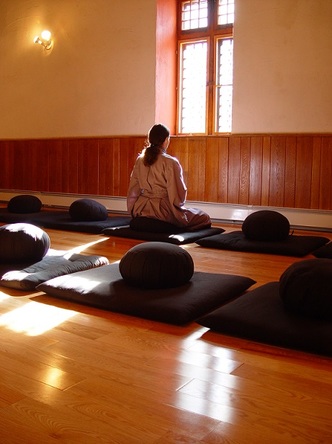I’ve become interested in meditation and Zen Buddhism, but I don’t really know where to start. How do I begin?A good place to begin is to see if you can attend some level of orientation to what Zen Buddhism is. Zen relies so much on your own experience. You can read about it, and you can go online and get information, but none of that really captures what the practice of Zen is. Because Zen is a practice, the way to experience it is to practice it.
There may be a centre near you. There are MRO (Mountains and Rivers Order) groups in Auckland, Rotorua, Manawatu, Wellington, Nelson and Christchurch, and they can each introduce you to the practice of Zen meditation (zazen). That’s where I would begin, once you have some sense that this is something that you’d like to explore. What are the benefits of beginning a practice of zazen?Most people come to a spiritual practice because they’re looking for something more in their life, or wish to address a challenge in their life. In some sense that’s self-referential, but it’s natural. The obvious benefits are that once you begin doing zazen, regularly, you will notice afterwards a sense of presence, a degree of calmness and equanimity, an ability to move through your day in a way that creates less conflict. Those are some obvious short-term benefits. It’s worth noting, though, that those are considered side benefits to the practice of zazen.
Is it necessary to sit with a group?It really depends what you want. If you want to realise your fundamental nature, if you want to awaken, if there’s a drive to seek who you really are, then the Buddha taught that the essential component is a relationship with the Buddha, Dharma and Sangha. But it’s fine to begin to sit at home by yourself and begin to explore zazen practice on your own. The challenge here is that sitting by yourself without formal instruction and the support of others sitting with you can be difficult. Also, it’s easy to get lost without the support of practitioners who can share their own experience and offer guidance on the spiritual path.
I have tried meditation and can’t seem to concentrate or control my mind.Everybody starts from where they are, and everybody starts with a mind that’s usually scattered, perhaps agitated, and without much ability to concetrate for very long. The practice – especially initially – is to work on concentrating the mind, so that it’s stable, and so that you can look deeply within yourself. At the beginning the important point is to respect the fact that the mind is all over the place, with many thoughts. Practice is designed to work with that scatteredness. As you continue to sit, the mind will become more stable, there will be fewer thoughts, and you’ll be able to go deeper into your zazen. It's a natural progression, but it takes time and it takes practice.
Are there any other things I should bear in mind when I start sitting zazen?It helps to have a quiet place to sit. It helps to have a sitting cushion, which in Zen is called a “zafu”. There are many types of cushions; some will be more supportive and appropriate to your body type and posture. It helps to have an altar. Pay close attention to the instructions in zazen, and return to these periodically. It helps to set up a regular schedule and sit daily if possible. Even sitting zazen a few minutes a day will effect your mind and therefore your life.
|
What are the Buddha, Dharma and Sangha?Each of these has several levels of meaning. The Buddha is at once the historical Buddha, and it’s also our inherent Buddha nature; the Buddha nature of everything. What’s realised through Zen practice is that everything rests in Buddha nature, and that everything includes you. As you sit zazen, your experience of seeing into your mind deepens. Your mind begins to gain a measure of stability, and begins to realise that there’s in fact nothing outside ourselves. That’s the fundamental realisation and the awakening of the Buddha.
The Dharma is the teachings of the Buddha, as well as all of phenomenal reality. And the Sangha is the group of practitioners, and all beings, sentient and insentient. In the course of practice, we begin to investigate each of these aspects of as our own direct experience. What makes someone a Buddhist? Can I join a group if I’m not a Buddhist?In the Mountains and Rivers Order, anyone is welcome to sit with us. In terms of their access to meditation, it’s irrelevant whether they consider themselves a Buddhist or not. If they want to practice Zen, then they’re welcome to sit with us.
What makes someone a Buddhist varies in the different schools of Buddhism. Within the Zen school, one becomes a Buddhist through Jukai. Jukai is a ceremony in which a person takes up the Buddhist precepts – the moral and ethical teachings of Zen Buddhism – as the guiding direction of their life. To take this up means to work with a teacher formally, and to study the precepts, and to do one's best to live the precepts. Is there much difference between the various kinds of Buddhism? How would I know where to go?Buddhism is a very diverse religion, with very diverse religious practices. For the sake of comparison, Buddhism is at least as diverse as Christianity. Different Buddhist schools give their own particular emphasis to practices held in common.
If you’re wanting to know more about the differences, it may be helpful to survey the main schools of practice. There are broad categories: Theravada Buddhism, Mahayana Buddhism, Vajrayana Buddhism. They each have specific and different emphases, but ultimately they’re one way, a single way, of awakening and following the Buddha’s path. All of it is really up to you. My advice is try, see, and trust your own experience. What are some of the best books for those of us new to Zen and Buddhism?For a general overview of Buddhism and basic Buddhist principles, What the Buddha Taught by Walpola Rahula provides a good grounding.
The Eight Gates of Zen by John Daido Loori looks at the basic aspects of Zen Buddhism as practised within the Mountains and Rivers Order. There are many other fine books, as well as books that may not be as helpful. Take a look at the reading list in the back of the Eight Gates of Zen. If you’re interested in getting an understanding of the background and actual practice of Zen Buddhism, that reading list will offer some assistance. Finally, how has Zen helped you in your life?To be honest, I don’t think of Zen as helping me in my life, because I don’t think of Zen as separate from my life. Having said that, I can appreciate that there have been many benefits from my practice. I’m present with my moment-to-moment life fairly consistently. I’m able to live a life that has a degree of kindness and compassion towards others and myself. I’ve grown in my capacity to be helpful to others in their life, and to help them address their suffering. For all these, I’m very grateful to my Zen teachers and the Buddha. The bottom line is that Zen has given me my life; my life has become my own as a result of Zen practice. Having your life as your own is a debt that you can never fully pay back, but I’m trying.
|
© 2020. ZEN INSTITUTE OF NEW ZEALAND.



